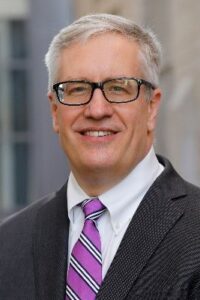Can Common Carrier Principles Control Dominance by Twitter and Google?

The Robert F. Boden Lecture is an annual highlight at Marquette University Law School, public health permitting. After a COVID-19 hiatus in 2020 and 2021—true community events require being in person—the Boden Lecture resumed yesterday. It did so most impressively, with Jim Speta, the Elizabeth Froehling Horner Professor at Northwestern University’s Pritzker School of Law, as Marquette Law School’s distinguished visitor.
For his lecture, Professor Speta took up “The Past’s Lessons for Today: Can Common Carrier Principles Make for a Better Internet?” The topic is especially timely in light of the Fifth Circuit’s decision last Friday upholding a Texas state law regulating internet platforms. Here is a taste of it:
In this lecture, I will address both the dominance of the internet platforms and the calls to regulate them as common carriers. To begin to define our terms, this reference to the platforms means the dominance by Google and Facebook, by Amazon and Apple (and to a lesser extent by Twitter and Microsoft), of the ways we receive information, exchange it, even understand it. The main concern is that these platforms are biased, that they discriminate, that they foreclose speech. That is why, today, platform critics—including governments—are reaching for the traditional law of railroads and of telephone companies: the law of common carriage. That once-dominant law forbade discrimination. In addition to the Texas and Florida statutes . . . , one Supreme Court Justice has written in favor of platform-focused common carrier regulation, as have numerous federal and state lawmakers, some academics, and numerous commentators. Bills have been offered or are pending in Congress and in many states, including Wisconsin.
I think the proposals for common carrier regulation of platforms are very right—and very wrong. I think they are right to worry about the dominance of internet platforms, and they are right that common carrier law, even though it smells musty and over the past few decades has largely been discarded in the United States, can be part of the solution. I think they are very wrong to target common carrier solutions at the platforms’ core operations themselves—to change the ways in which users are permitted access, content is moderated, and search results are provided. Such platform regulation does not fit the common carrier model. Platforms are not merely conduits of user behavior, although they are partly that. Platforms also seek to create a particular kind of speech experience that holds the attention of their users. If we are required to have an analogy to an old form of media, platforms are more like newspapers and broadcasters than telephone companies, though I think the best single analogy is to bookstores. Newspapers, broadcasters, and bookstores curate the content they offer their customers, and common carrier rules have never applied to them. Even more concerning, laws directly controlling platforms simply give the government unprecedented power over the content experiences these private companies seek to create. I think it almost certainly violates the First Amendment and that the Fifth Circuit’s decision to the contrary is quite wrong.
Instead, here’s what we can do: we can and should at least try to address concerns about the currently dominant platforms by using law to make it easier to have more platforms. This is, truly, the essential argument that I will make: Common carrier solutions should be targeted at the infrastructure that enables platforms to be built and to reach consumers. When we think about platforms, we usually think about the ways that users interact directly with Google or Twitter or the other services. But, in fact, myriad companies provide infrastructure and services that both enable user access and platform operation—companies that transmit data, such as the cable companies and other internet services providers that carry data, companies that host websites and platforms, and services such as website defense or payment processing that support both new and established platforms. In the past, these providers have denied services to some new platforms that sought to establish alternative services. Applying a lighter-touch (and differently placed) version of common carrier regulation to the internet’s support providers, I will seek to convince you, can increase the possibility of alternative platforms. This is our best hope to enrich our speech choices and ecosystem without government censorship.
One may read the entire lecture here, even in advance of its publication next year in the Marquette Law Review and Marquette Lawyer.
I am well familiar with the common carrier regime that Professor Speta invokes, as he explains, for inspiration (see, for example, here and here for some of my own relevant past). This Boden Lecture strikes me as a deeply important and unusually judicious contribution to the current debate, well, raging, it is not too much to say, about appropriate public policy in this internet age.
That Professor Speta deftly interweaves references to past Boden lecturers, such as Columbia’s Professor Thomas W. Merrill (2010) and UCLA’s Professor Eugene Volokh (2006), is a fine local touch. Yet his lecture merits engagement nationally.

 As a former Milwaukee County Circuit judge and Wisconsin Supreme Court justice, I have watched people try to resolve highly emotional and upsetting conflict through the legal process or by use of (social) media. For the last 25 years I have become convinced that we need to offer hurting people restorative approaches—a forum in which each person can be truly heard, and their concerns addressed while managed by experienced and sensitive facilitators/mediators to help the parties work toward healing. As a result, our Marquette Law Andrew Center for Restorative Justice provides people, neighborhoods and institutions support for transformational restorative processes.
As a former Milwaukee County Circuit judge and Wisconsin Supreme Court justice, I have watched people try to resolve highly emotional and upsetting conflict through the legal process or by use of (social) media. For the last 25 years I have become convinced that we need to offer hurting people restorative approaches—a forum in which each person can be truly heard, and their concerns addressed while managed by experienced and sensitive facilitators/mediators to help the parties work toward healing. As a result, our Marquette Law Andrew Center for Restorative Justice provides people, neighborhoods and institutions support for transformational restorative processes. Today has National Voter Registration Day—a good time to remind everyone register to vote so that all eligible voters can make their voices heard on Election Day (which, by the way, is Tuesday, November 8). While Wisconsin allows same-day voter registration, save yourself the time and the hassle of doing it all on Election Day and register now.
Today has National Voter Registration Day—a good time to remind everyone register to vote so that all eligible voters can make their voices heard on Election Day (which, by the way, is Tuesday, November 8). While Wisconsin allows same-day voter registration, save yourself the time and the hassle of doing it all on Election Day and register now.